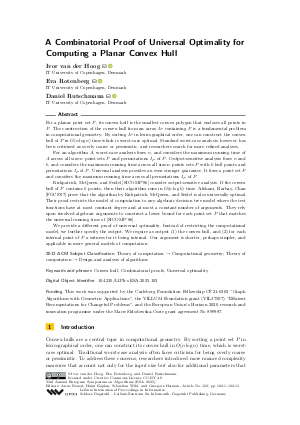A Combinatorial Proof of Universal Optimality for Computing a Planar Convex Hull
Authors
Ivor van der Hoog  ,
Eva Rotenberg
,
Eva Rotenberg  ,
Daniel Rutschmann
,
Daniel Rutschmann 
-
Part of:
Volume:
33rd Annual European Symposium on Algorithms (ESA 2025)
Part of: Series: Leibniz International Proceedings in Informatics (LIPIcs)
Part of: Conference: European Symposium on Algorithms (ESA) - License:
 Creative Commons Attribution 4.0 International license
Creative Commons Attribution 4.0 International license
- Publication Date: 2025-10-01
File

PDF
LIPIcs.ESA.2025.102.pdf
- Filesize: 0.96 MB
- 13 pages
Document Identifiers
Subject Classification
ACM Subject Classification
- Theory of computation → Computational geometry
- Theory of computation → Design and analysis of algorithms
Keywords
- Convex hull
- Combinatorial proofs
- Universal optimality
Metrics
- Access Statistics
-
Total Accesses (updated on a weekly basis)
0PDF Downloads0Metadata Views
Abstract
For a planar point set P, its convex hull is the smallest convex polygon that encloses all points in P. The construction of the convex hull from an array I_P containing P is a fundamental problem in computational geometry. By sorting I_P in lexicographical order, one can construct the convex hull of P in O(n log n) time which is worst-case optimal. Standard worst-case analysis, however, has been criticized as overly coarse or pessimistic, and researchers search for more refined analyses. For an algorithm A, worst-case analysis fixes n, and considers the maximum running time of A across all size-n point sets P and permutations I_P of P. Output-sensitive analysis fixes n and k, and considers the maximum running time across all size-n points sets P with k hull points and permutations I_P of P. Universal analysis provides an even stronger guarantee. It fixes a point set P and considers the maximum running time across all permutations I_P of P. Kirkpatrick, McQueen, and Seidel [SICOMP'86] consider output-sensitive analysis. If the convex hull of P contains k points, then their algorithm runs in O(n log k) time. Afshani, Barbay, Chan [FOCS'07] prove that the algorithm by Kirkpatrick, McQueen, and Seidel is also universally optimal. Their proof restricts the model of computation to any algebraic decision tree model where the test functions have at most constant degree and at most a constant number of arguments. They rely upon involved algebraic arguments to construct a lower bound for each point set P that matches the universal running time of [SICOMP'86]. We provide a different proof of universal optimality. Instead of restricting the computational model, we further specify the output. We require as output (1) the convex hull, and (2) for each internal point of P a witness for it being internal. Our argument is shorter, perhaps simpler, and applicable in more general models of computation.
Cite As Get BibTex
Ivor van der Hoog, Eva Rotenberg, and Daniel Rutschmann. A Combinatorial Proof of Universal Optimality for Computing a Planar Convex Hull. In 33rd Annual European Symposium on Algorithms (ESA 2025). Leibniz International Proceedings in Informatics (LIPIcs), Volume 351, pp. 102:1-102:13, Schloss Dagstuhl – Leibniz-Zentrum für Informatik (2025)
https://doi.org/10.4230/LIPIcs.ESA.2025.102
BibTex
@InProceedings{vanderhoog_et_al:LIPIcs.ESA.2025.102,
author = {van der Hoog, Ivor and Rotenberg, Eva and Rutschmann, Daniel},
title = {{A Combinatorial Proof of Universal Optimality for Computing a Planar Convex Hull}},
booktitle = {33rd Annual European Symposium on Algorithms (ESA 2025)},
pages = {102:1--102:13},
series = {Leibniz International Proceedings in Informatics (LIPIcs)},
ISBN = {978-3-95977-395-9},
ISSN = {1868-8969},
year = {2025},
volume = {351},
editor = {Benoit, Anne and Kaplan, Haim and Wild, Sebastian and Herman, Grzegorz},
publisher = {Schloss Dagstuhl -- Leibniz-Zentrum f{\"u}r Informatik},
address = {Dagstuhl, Germany},
URL = {https://drops.dagstuhl.de/entities/document/10.4230/LIPIcs.ESA.2025.102},
URN = {urn:nbn:de:0030-drops-245715},
doi = {10.4230/LIPIcs.ESA.2025.102},
annote = {Keywords: Convex hull, Combinatorial proofs, Universal optimality}
}
Author Details
Funding
This work was supported by the Carlsberg Foundation Fellowship CF21-0302 "Graph Algorithms with Geometric Applications", the VILLUM Foundation grant (VIL37507) "Efficient Recomputations for Changeful Problems", and the European Union’s Horizon 2020 research and innovation programme under the Marie Skłodowska-Curie grant agreement No 899987.
References
- Peyman Afshani, Jérémy Barbay, and Timothy Chan. Instance-optimal geometric algorithms. In IEEE Symposium on Foundations of Computer Science (FOCS), pages 129-138. Association for Computing Machinery, 2009. URL: https://doi.org/10.1109/FOCS.2009.34.
- Peyman Afshani, Jérémy Barbay, and Timothy M. Chan. Instance-optimal geometric algorithms. Journal of the ACM (JACM), 64(1), March 2017. URL: https://doi.org/10.1145/3046673.
- Mark de Berg, Matthew Katz, A Frank Van der Stappen, and Jules Vleugels. Realistic input models for geometric algorithms. In Symposium on Computational geometry (SoCG), pages 294-303, 1997. URL: https://doi.org/10.1145/262839.262986.
- Jeff Erickson. Dense point sets have sparse delaunay triangulations or “... but not too nasty”. Discrete & Computational Geometry, 33:83-115, 2005. URL: https://doi.org/10.5555/3115459.3115691.
- Bernhard Haeupler, Richard Hladík, Václav Rozhoň, Robert E Tarjan, and Jakub Tetĕk. Universal optimality of dijkstra via beyond-worst-case heaps. In Symposium on Foundations of Computer Science (FOCS), pages 2099-2130. IEEE, 2024. URL: https://doi.org/10.1109/FOCS61266.2024.00125.
- Bernhard Haeupler, Richard Hladík, John Iacono, Václav Rozhoň, Robert E. Tarjan, and Jakub Tětek. Fast and simple sorting using partial information. In ACM-SIAM Symposium on Discrete Algorithms (SODA), pages 3953-3973, 2025. URL: https://doi.org/10.1137/1.9781611978322.134.
- David G Kirkpatrick and Raimund Seidel. The ultimate planar convex hull algorithm? SIAM Journal on Computing, 15(1):287-299, 1986. URL: https://doi.org/10.1137/0215021.
- Jiří Matoušek, János Pach, Micha Sharir, Shmuel Sifrony, and Emo Welzl. Fat triangles determine linearly many holes. SIAM Journal on Computing, 23(1):154-169, 1994. URL: https://doi.org/10.1109/SFCS.1991.185347.
- Ivor van der Hoog, Eva Rotenberg, and Daniel Rutschmann. Simpler optimal sorting from a directed acyclic graph. In Symposium on Simplicity in Algorithms (SOSA), pages 350-355. SIAM, 2025. URL: https://doi.org/10.1137/1.9781611978315.26.
